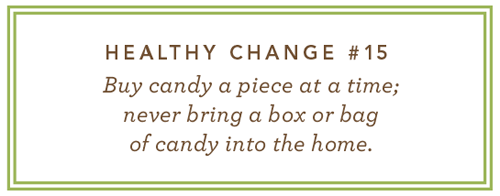
The quick answer: If there’s candy in the house, someone will eat it. Buy your favorite sweets by the piece, not by the bag or box.
_______________________________________________________________________
Confession
I don’t eat candy bars. Usually. But the kids left us a package of Hershey bars, the larger ones that are sectioned, after making s’mores at a beach bonfire. “Wouldn’t those Hershey bars be a little healthy,” I kidded myself, “if I ate them with some fresh walnuts?” The combination tasted so good that I fell off the sugar wagon and ate the whole darn package.
Two days later I had a fast moving sore throat-cold that knocked me down for a week. Now this isn’t supposed to happen if you’re eating well—that’s been my experience for several years. So I have this bad feeling that gorging on sugar suppressed my immune defense and made me vulnerable. So I’m contrite (and coughing) as I write; I knew better. Ever done that?
A Quick Review on Sugar
The beautiful wife heard that a honeybee only makes 1/12 teaspoon of honey in its lifetime. Historically, sugar was so scarce before the Industrial Revolution that only a king could gorge on it. Today everyone can . . . and many do. Excessive sugar intake is our biggest health problem, leading to diabetes, heart disease, and increased risk for cancer. This is all well documented. Here are three excellent researchers who have warned about sugar:
Gary Taubes: If you want a serious book on the problem of sugar, read Gary Taubes, Good Calories, Bad Calories. You hear a lot of people who should know better suggest that all calories are equal. It simply isn’t true. Eating 500 calories of sugar a day—the American norm—will definitely have a different result than eating 500 calories of fruits and vegetables.
Bottom line, to expose yourself to overweight, diabetes, heart disease, and cancer, follow the American practice of excessive sugar intake. Ugh.
David Ludwig, MD, PhD: Here’s a guy dealing with the sugar problem every day—his specialty is child obesity. It’s a terrible and growing problem that led to a radical proposal: Severely obese children should be removed from the care of their parents. Ludwig is best known for his YouTube video, “Sugar: The Bitter Truth.” If you haven’t seen it, you should.
John Yudkin, MD, PhD: He’s gone now but Yudkin was the first scientist to link sugar intake to diabetes and heart disease; others made the connection to cancer. His 1972 expose of sugar, Pure, White and Deadly, made him famous in England. The U.S. version is titled Sweet and Dangerous, The new facts about the sugar you eat as a cause of heart disease, diabetes, and other killers. The title says it all. (First edition copies of these books are collector items.)
Slashing Sugar Intake
To reform our diet, we must slash our sugar intake—this has to be the first step. IF you want proof, try a 4-week sugar fast and see how much better you feel. The AHA offers this wise counsel: Limit sugar intake to 6 tsp (25 grams) daily for women; 9 tsp for men (it’s based on body mass). The 2010 Dietary Guidelines for Americans makes a similar recommendation. We just need to “do it.”
Healthy Change #1 attacked our biggest source of excess sugar: If you consume sugary drinks, real or diet, limit yourself to one (12 oz.) serving per week.
Healthy Changes #4 & 10 promote whole grains while reducing sugar intake with this wise rule: Packaged foods must contain more grams of natural fiber than sugar.
Now Healthy Change #15 introduces a new rule based on this observation: If there’s candy in the house, someone will eat it—probably Mom. But sometimes it’s Dad, per my confession above. So here’s the rule:

Please comment: How do you manage sugar in your life? How have you gotten past the false belief that artificial sweeteners like those in “diet” drinks—such a sad, pathetic name—are somehow healthier than real food? Tell about your experience with a "sugar fast." Or share your sad story of falling off the sugar wagon.